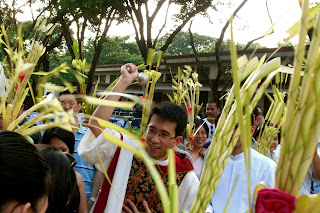
1 May 2011 2nd Sunday of Easter
Acts 2:42-47; Psalm 118; 1 Peter 1:3-9; John 20:19-31
The message of the Gospel today is the very miracle of Easter. That whatever is bound, enchained, enslaved, or unfree can be loosened, liberated and freed through forgiveness. By exercising this capacity to forgive, we free each other from what bounds us like pain, anger, and resentments. And by being forgiven, we become free. In this freedom, we achieve what is elusive to most of us: peace.
Let me explain. Let us look at our personal relationships. There are many resentments within our families: marital conflicts, custody battles, and/or inheritance. Between friends, there are strained relationships: a betrayal, a falling out, or a hurt from an uncharitable remark.
Recent records in history has seen the bloodiest effect of racial and religious hatred. The most glaring is the holocaust. Christians against Jews. Or, genocide in Central and South Africa. Or the escapes of Vietnamese refugees to other countries caused by strife and violence. The killings in Cambodia. Our list can go on and on and on. The point is clear: unless there is healing by forgiveness, peace will not come by easily.
But forgiveness is easier said than done. The deeper the wound, the longer it takes. Genuine forgiveness is not given casually: as if the violation has not been done as the popular maxim: forgive and forget. We should not forget or else the violation is repeated and tolerated. Aren't we, Filipinos, suffering from a short-term memory: the victimizers of the past are now back in the seats of government? Isn't it true that the People's Revolution of 1986 has been like a ningas-cogon: aren't we worse than before? Isn't it correct that misbehavior in our personal relationships are repeated because we try to forget as if they never occurred? Forgiveness is given, not so that we repeat our past, but so that we begin a new future.
Forgiveness is given by authentically acknowledging the wounds for what they are, and what they have caused. And the acceptance that we are capable of being hurt and wounding others. Unless we are able to see this (vs self-righteousness), genuine forgiveness cannot come by.
Forgiveness involves humility. It involves swallowing our pride. This is what I experience in the Sacrament of Reconciliation. The struggle before receiving the Sacrament is the very thought of acknowledging our woundedness and sinfulness to another person, in shame. Why would I confess to a priest who is also a sinner like me - or even worse than me? Confession is indeed a humbling experience, yet genuine repentance and humility are the conditions for forgiveness to happen. And as a priest, who is very much a sinner too, I am very grateful to the trust a repentant sinner accords me.
The Gospel tells us that Jesus showed Thomas His very wounds. Jesus acknowledges the wounds that has been inflicted on Him and then identifies Himself with it. What we have become has been formed and molded by our wounds. But even in His last breath, Jesus forgives: "Forgive them, Father, for they do not know what they are doing?" That is why, today is also called, Divine Mercy Sunday. We celebrate God's mercy on us, but at the same time, we are also challenge to be merciful.
But peace in genuine forgiveness is made possible by the Spirit. Jesus said, "Peace be with you" and then, He says, "Receive the Holy Spirit" and after, He breathe on them. The exchange of breathe in the Spirit is important. Remember how God breathe on Adam and Eve for life to occur in Genesis? Breathing is what makes us alive; the Spirit thus makes us genuinely live and therefore, forgive. Paul said that forgiveness is made possible by the Spirit. And therefore, this power is a gift of the Lord to us: we are capable of genuine forgiveness. However, we have to work on it. The Our Father gives us the condition: "And forgive us our sins, AS we forgive those who sin against us."
Together with the breath of the Resurrected Christ, we can therefore free ourselves from what makes us bound. Remember a tenet I live by: He, who angers you, controls you. The miracle of Easter is freedom from what or who controls you, given through forgiveness, for the peace that we all yearn.





